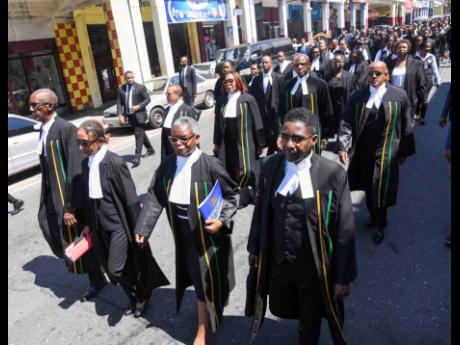Women inspire in key judiciary roles
Chief justice celebrates achievements of females in court system while celebrating Judiciary Day
Chief Justice Bryan Sykes yesterday lauded the many strides made by women in Jamaica’s judiciary and reiterated the courts’ commitment to reducing case backlogs, noting that great strides have been taken at all levels in recent years.
These were among Sykes’ main points during yesterday’s inaugural Judiciary Day, which saw members of all sectors of the nation’s judiciary march on King Street, from the Kingston Parish Church to the Supreme Court.
It was held under the theme ‘Preserving Justice, Honouring History, Embracing the Future’, and was aimed at fostering a sense of pride and confidence among the public in the judicial staff.
Organisers said it was also meant to reassure the public of the judiciary’s role as a pillar of justice and fairness, integral to national development; and it seems that message was well received by members of the public who lined the sidewalks yesterday, snapping photographs, singing along with the marchers, and, generally, looking on in awe.
Females made up the bulk of the marchers, a reality amplified in Sykes address in the Judiciary Day celebrations yesterday.
“Why shouldn’t we as guardians of justice dedicate a day to reflect on our journey, its triumphs and its challenges? Why shouldn’t we honour the profound contribution of our judiciary to the very stability and development of our Jamaican democracy?” asked Sykes during his presentation, noting the many strides taken in composition of the judiciary.
“Today, we have nine out of 13 appellate judges who are women, 31 of 42 Supreme Court judges who are women, and 53 out of 67 judges in the parish courts who are women,” he said, noting that these were the descendants of those slaves once considered property.
Despite inheriting such a historic system, he said, Jamaica’s judiciary is dedicated to the task of ridding itself of the worst aspects of a colonial institution and taking on those of one that upholds human rights.
The stories of some of the women of Jamaica’s judiciary are highly inspirational, he charged, noting many first achievements made by them. Among those lauded were the first female judge of the parish court, the first female president of the Court of Appeal, and the first female chief justice. But the day was not about judges, but about the men and women at all levels, and the many agencies, such as the Jamaica Constabulary Force, the Office of the Children’s Advocate, among others.
Meanwhile, Sykes lauded the efforts by such individuals and other stakeholders in reducing the backlogs.
“Why shouldn’t Judiciary Day be celebrated to mark the fact that over 90 per cent of total hearings in the Supreme Court are now conducted electronically?” he said, noting that the once-pressured parish court system has been free of backlog for the past three years; and at under three per cent, Jamaica exceeds the international benchmark for backlogs, which is five per cent.
“Why shouldn’t we applaud a Court of Appeal that continues its exceptional performance with a clearance rate exceeding 100 per cent, steadily reducing its backlog? ... . We should celebrate the Supreme Court, while not where we need to be, but for the first time our clearance rate is at 83 per cent; never before in our history,” he said, adding that the clearance rate in the Supreme Court five years ago was less than 40 per cent.
Meanwhile, Justice Minister Delroy Chuck, in his address, said that it is important that Jamaicans understand that the country has some of the most remarkable people working in its judiciary. Much more can be done, he charged, but explained that the high expectations will take time.
For example, after a visit to Rwanda two years ago, he had hoped the paperless system would have been implemented in Jamaica, and that, on the suggestions of Sykes, that more court hearings would be opened up to the public; but procurement delays and bureaucracy have fuelled the delays. Still, he would like to reach a place where there are set completion times for even complex court matters.
“Let us be frank, the few complaints we get now are about the length of time at the Supreme Court level... . It is not the fault of the judiciary, but we need to get everything properly in place so that cases can be tried within a reasonable time,” he charged.
“Lawyers in Jamaica have been asking for speedy trial legislation. This minister of justice doesn’t propose to go there. I think it is important that we use moral suasion, to ask all stakeholders, the lawyers themselves, the input form the Ministry of Justice and from the director of public prosecution, to ensure that we can in fact complete cases, especially criminal cases, within a reasonable time,” he said. Chuck also noted that while the economy is strong, it can get stronger with speedier turnaround time in court.
“When $50 billion of assets are tied up in the bank because disputes are not resolved, then it has an impact on how well the economy can grown. And I have no doubt that in the Supreme Court, hundreds of billions of dollars are tied up and are not being utilised effectively in the system because litigants are awaiting a judgment,” he stated.


